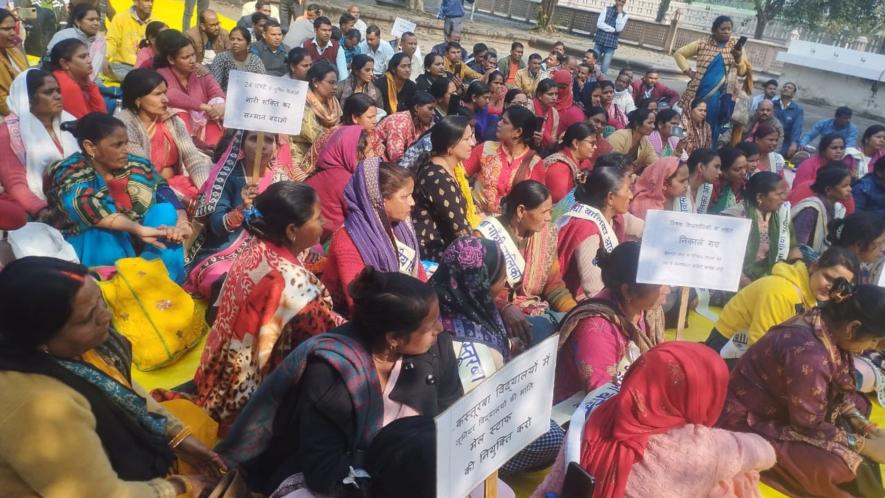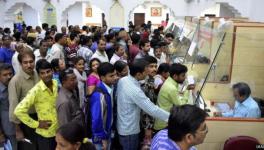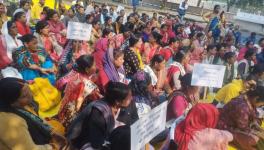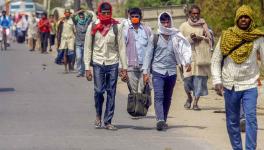Class-IV Kasturba Gandhi Balika Vidyalaya Staff Protests to Demand Job Regularisation, Basic Pay

Lucknow: A large number of Class-IV employees of Kasturba Gandhi Balika Vidyalaya (KGBV), an important component of the government’s flagship Samagra Shiksha Abhiyan, in Uttar Pradesh (UP) protested in Lucknow on Saturday demanding regularisation of jobs and basic pay and social security.
About 1,000 teachers, wardens, accountants, security guards, peons, cooks, who protested under the aegis of the Kasturba Gandhi Balika Vidyalaya Teacher and Non-Teaching Union All India said, that the state should follow the Supreme Court’s guidelines on equal pay for equal work.
There are 746 KGBVs in the state with around 12,000 employees. Contractual assistant teachers of these schools are paid Rs 24,000 per month whereas the basic pay for the post is around Rs 50,000.
The KGBV employees also complained of not getting paid on time. The protesters, who also demanded the release of two-month salary dues, said that their honorariums have not been revised for the past five years.
The teachers handed over a memorandum addressed to chief minister Yogi Adityanath regarding their demands, including job regularisation, ensuring salaries as per the 6th Pay Commission, providing life and health insurance, guaranteeing all types of leave and proper working hours.
Syeda Khatun (Yasmin Khan), a Urdu teacher at the KGBV in the Balrampur district, told NewsClick that there is a huge difference between the salaries of KGBV staff and government primary school teachers for the same work. “Even leaves and other benefits are different.”
Syeda also said that Urdu teachers at KGBVs are paid less than their counterparts teaching in other language teachers, including Hindi and English.
“We make less than half compared to Class-IV employees at a council school run by the government. For example, wardens get Rs 27,000, full-time teachers staying on the campus Rs 22,000, accountants who perform multiple duties with the Basic Shiksha Adhikari and Block Resource Centre Rs 11,000, Urdu teachers Rs 13,200 while Hindi and English teachers earn Rs 22,000. Besides, Urdu teachers are being removed from places where the Muslim population is less than 20%,” Syeda added.
Syeda demanded that Urdu language teachers should get full-time status and honorarium like full-time teachers.
Accusing the state government of “step-motherly” treatment to KGBV staff, she said that Adityanath recently asked for the details of contractual workers to regularise their jobs but not KGBV staff.
Another KGBV staff, Anuradha, an assistant cook who came from Bijnor to participate in the protest, said, “Our salary has not increased for the last five years. In my joining letter, I was told that I have to cook for hundred children, but I am cooking food for around two hundred children. I receive only Rs 5,000. Is this justified?”
She said that even a daily wager earns more. “Should we run home or educate our children for Rs 5,000?” she asked adding, “We are also asked to take selfies for attendance.”
Another cook said, “I cook and feed more than two hundred children daily. I stay at the school, away from my family, and paid only get Rs 4,600. Is this fair?”
A KGBV guard gets only Rs 5,500 for a 24-hours shift, a head cooks Rs 6,000 while an assistant cook only Rs 5,000 per month, according to union leaders.
“We have a huge responsibility of look after children round the clock. But we are paid a meagre salary,” another guard said.
All India Central Council of Trade Unions state president Vijay Vidrohi told the protesters that it’s the “era of labour and intelligence theft”.
“The government, which boasts of a welfare state, is not paying one day’s worth of food for a month’s labour. We had achieved eight hours of work, permanent work, minimum wage, social security, and weekly, casual, medical and annual leave and maternity leave for women employees through struggle. But both state and the Centre abolished 44 labour laws and the four labour codes legitimise slavery. If the government implements them, there will be no right to form unions and agitate.”
Vidrohi said, “The first task is to determine our role in uprooting the anti-labour and anti-employee capitalist governments by becoming a part of the ongoing fight to save the labour rights. We have to strengthen that fight by adding our voice to it."
KGBVs are residential schools established in 2004 to ensure quality education to girls of Scheduled Castes, Scheduled Tribes, Other Backward Classes and minority communities in educationally backwards blocks. KGBVs have classes from 6 to 12.
Notably, in 2020, the UP government ordered a “shutdown” of KGBVs and started providing temporary admission to the students in upper primary schools citing the pandemic.
Get the latest reports & analysis with people's perspective on Protests, movements & deep analytical videos, discussions of the current affairs in your Telegram app. Subscribe to NewsClick's Telegram channel & get Real-Time updates on stories, as they get published on our website.
























